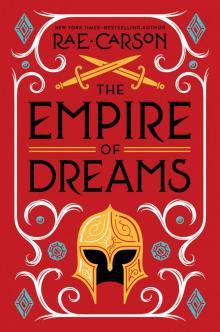- Home
- Rae Carson
Fire and Thorns 00.7: King's Guard
Fire and Thorns 00.7: King's Guard Read online
Dedication
FOR SARAH AND RYAN,
WHO THOUGHT THEY WERE JOKING
WHEN THEY MADE ME PROMISE
MANY YEARS AGO
TO DEDICATE SOMETHING TO THEM
Contents
Dedication
Chapter 1
Chapter 2
Chapter 3
Chapter 4
Chapter 5
Chapter 6
Chapter 7
Chapter 8
Chapter 9
Chapter 10
Chapter 11
Chapter 12
Chapter 13
Chapter 14
Chapter 15
Chapter 16
Excerpt from The Bitter Kingdom
About the Author
Back Ad
Copyright
About the Publisher
1
THE morning sun crawls over the palace wall when I enter the training yard for recruit selection. I’m the first one here, not because there is honor in being first, but because I have the shortest distance to come. I already live in the palace.
I carry three items; Royal Guard recruits are allowed exactly three possessions from their previous lives. We give up everything else—title, property, and loyalty to anyone other than our king—for the privilege of joining the most elite fighting force in all of Joya d’Arena. Or I guess I should say the chance of joining; being a recruit is no guarantee of making the cut.
I don’t wait long before the other recruits begin to arrive, their own three items in hand. They are all older than I am, taller, stronger. Most have served a year or two in countship guards, a few in the army. All of them keep their distance. They expect me to fail, partly because I’m only fifteen years old, but mostly because I didn’t make it to recruit training on my own merit. I’m here as a special favor to the king.
For two years I ran errands in the palace. I stood at King Nicolao’s side when he met with condes and ambassadors, dictated reports, and discussed strategy with his aides. When I wasn’t with the king, I served Prince Alejandro, and eventually I became his squire. Now Alejandro is king, and I have asked him for a boon.
“All I want,” I told him, “is the opportunity to prove myself.”
Even he believes that I am too young for the Guard, too inexperienced, and he suggested I wait a few years. But I’m tired of waiting.
The iron portcullis slams down, locking us in.
Lord-Commander Enrico strides toward us, dressed in shining armor, the red cloak that marks him as Royal Guard whipping at his heels. He is one of the tallest and most polished men I’ve ever known. His clothes are always impeccable, and the curls of his hair are oiled to shine. He’s a commoner by birth, though rumor throughout the palace is that he has aspirations of true nobility and fancies himself a player in the game of politics.
“Form a line!” yells Commander Enrico.
We run to comply. The training yard is a massive oval with dusty, hard-packed ground surrounded on all sides by a stone wall. At one end are straw practice dummies and archery targets. At the other, a dark archway leads to the barracks. Several Royal Guardsmen lean against the portcullis, arms crossed, faces amused. Sitting on the wall on either side is a gathering crowd: Royal Guard, palace guard, city watch, and even a handful of young noblewomen. Everyone has come to gawk at the new recruits.
Usually, the king comes to watch recruiting day too. I asked him not to, just this once. There’s no way I could stand here at attention being gawked at without catching Alejandro’s amused gaze. No way I could pretend he wasn’t sitting out in the open, dangerously exposed. And I really, really need to pretend he’s not a factor today. That he is not, in fact, my good friend.
Enrico walks the length of our line, arms behind his back, eyebrow raised in either contempt or challenge. The first recruits he addresses are Tomás and Marlo of the city watch, recommended by General Luz-Manuel himself. They are about twenty years old, with nice full mustaches and the ease of stance that comes with being the best at everything they’ve ever done. Enrico welcomes them warmly.
If they’re going to be the commander’s favorites, it would be smart for me to get to know them.
Enrico pauses next before a lean young man with dark skin and quick eyes. He wears ragged homespun, and his right shoe has a hole in the toe. He carries a bow, a quiver, and a bundle of arrows as his chosen items, not realizing that the Guard will give him better weapons.
“Fernando de Ismelda,” Enrico says. “You won the kingdom’s archery competition. I gather it was quite a surprise to everyone.”
“Not to me,” the boy says.
I decide that I like Fernando de Ismelda.
But Enrico frowns. He is silent a long time, trying to make Fernando uncomfortable. Finally, he says, “It’s true that the Royal Guard is a place where men of station as low as yours can rise to the highest ranks in the kingdom, based on their own merits. But you’ll find that much more is required than just being a good shot.”
Lord-Commander Enrico moves on to the young man standing beside me, a giant with hands like paddles. “And you are?” he says.
“Lucio, my lord,” the young man answers.
Enrico nods. “Ah, yes, former squire to Conde Treviño. I’ve heard good things about you, son.”
“Thank you, my lord.”
Either Enrico is getting bad information, or he’s being deliberately false to test the rest of us. We’ve all heard of Lucio of Basajuan, a notorious bully with a penchant for drunken watch shifts. One of his three items is an amphora of wine, which he slings one-handed the way most men would carry a jug. Surely, someone advised him against that. Just as surely, Lucio ignored them.
I’m not the only one who is here as a favor to a powerful man. Lucio is the youngest son of Conde Treviño’s wealthiest supporter, and the conde found it problematic to discipline him without offending the boy’s father. So Lucio was sent to the Royal Guard either as a last-ditch attempt at reform or as a way of washing him out of the conde’s service without blame.
Enrico sizes me up last. Sweat trickles down my temples, and my three possessions grow heavy in my arms. I’m not sure what he’s waiting for. Maybe he’s testing me under the burden of silence. I’ve seen how waiting, how not knowing, can break a man. But not me. Enrico can stare as much as he wants.
“You are Hector de Ventierra, yes?” Enrico says coldly. “Third son of Conde Ricardón de Ventierra?”
I stare straight ahead, focusing on the king’s crest, which flaps in the breeze above the portcullis. But the sun catches on the commander’s bronze epaulets, flashing fire in my eyes, and I can’t help but wince.
“Just Hector now, my lord,” I say.
He knows perfectly well who I am. He is Alejandro’s personal guard and I’m his squire. We’ve rubbed shoulders countless times.
“Just recruit now. The Guard is a place for men who work and get things done, not for lordlings eager to play at being soldier. What did you bring with you, boy?”
“A blanket, my lord.”
“Why did you bring a blanket?”
“The recruit quarters are said to be cold, my lord.”
“That thing looks more like a dress for a princess ball.”
Several of the recruits snicker. This is a trick. He didn’t ask a question, so I am not supposed to answer.
Alejandro warned me that the recruit barracks is really a dungeon that gets too chilly for our one-blanket allotment. So Queen Rosaura, who is bedridden with a difficult pregnancy, made me a quilt. It’s bright and shimmering, a patchwork of scraps from old gowns, and it would indeed look perfect on the bed of a princess. It’s guaranteed to earn me
a thrashing or two, but Rosaura is one of the best people in the world, and bringing it seemed like the right thing to do.
“What’s that on top of your dress, princess?” Enrico says.
“A memento from my brother’s ship, my lord.”
My brother’s wife, Aracely, gave it to me. It’s a decorative plaque made of sea-smoothed ship planking. Burn-etched into the wood are the words, “Harsh winds, rough seas, still hearts.” Tiny pinkish shells are arranged into a border around the edges. Hidden within each shell is a jeweled bead. It’s a small fortune, a hedge against an uncertain future. “No man or woman should be wholly dependent on another,” she said. “If the Guard doesn’t work out, or if you ever decide you need to escape, this will give you something to start over with.”
“So,” Enrico says. “Our princess is homesick for his big brother.”
Again, a statement, not a question. I do not reply, though several retorts suggest themselves. If the hardest thing I have to do is listen to you talk, then I can do that all day, my lord.
He points to the third item. “A book! You brought a book?”
“Yes, my lord.” It’s not a manuscript, but an actual bound book about the architectural history of Joya d’Arena. A gift from my mother. The last several pages are blank. I can write whatever I want in them.
“You expect to be so bored here, to have so much free time, that you will be able to read books at your leisure, like priests in a monastery. Do I look like I run a monastery?”
“Not last feast day, when you brought in a wagonload of harlots.”
In my defense, he did ask me a question.
I expect a blow. A scolding at least. The crowd is silent, expectant. Drying sweat itches on my cheek, but I refuse to scratch, reminding myself that I can handle it. I can handle anything.
“Make no mistake,” Enrico says finally. “I never would have accepted your application were it not for the king’s order. I expect you will be expelled within a month.”
His forthrightness makes me bold. “I expect you will be surprised, my lord.”
“It’ll happen within a day if you don’t learn to hold your tongue and know your place.” He turns and speaks loudly to the whole line. “The king always shows up to view the Guard recruits on the first day. But he didn’t today. And do you know why? It’s because he didn’t want to see his pretty little princess fail.”
My face burns. But in a way I feel relieved. Enrico has said the thing everyone is thinking, and it’s like a hot, tight blanket has been lifted from the training yard and everyone can breathe. Or maybe just me.
Lord-Commander Enrico steps back, draws his sword, and raises it to the sky. Loudly enough for the whole city to hear, he yells, “Do you have what it takes to be Royal Guard?”
“Yes, my lord!” we answer in unison.
The Guards lounging by the portcullis snigger to one another.
“Can you work harder than you’ve ever worked—through pain, through pride, through exhaustion—to become something more?”
“Yes, my lord!”
“Will you give up everything you own, everything you are, and swear to protect the king and his interests even unto death?”
“YES, MY LORD!”
His eyes narrow to slits, and he says in a normal voice, “We shall see.” He sheaths the sword, sending it home with a swick! of finality.
He indicates the portcullis with a lift of his chin, and one of the guards lounging there peels off and steps toward us. “This is Captain Mandrano, my second-in-command,” Enrico says of the approaching guard. “He’ll play nurse to you whelps for the rest of the day. You will follow his orders without question, as if they come from the king himself. Or”—he stares directly at me—“you will be sent home.”
The worst is over. Now I’ll be able to show them what I’m worth.
2
THE iron portcullis squeals as it rises, and once Enrico has passed into the cool shadows of the barracks, it slams down behind him with a clang.
Odd. I’ve watched recruiting day for the Royal Guard for years, even before it became my plan to join. The lord-commander himself always oversees the first day’s evaluations. Always.
Captain Mandrano paces before us with hard purpose. He is a beast, with boulders for shoulders and tree trunks for arms. A white scar bisects the right half of his mouth, lifting his lip into a permanent sneer, but a steady intelligence in his eyes gives me hope. This is a man I can impress, a man who will see.
The first thing the captain will do is put us through a series of exercises to assess our speed and strength, our coordination and reaction time, our judgment. It happens every year. Sometimes, one or two recruits are cut on the very first day. It’s the reason people line the wall, turning the training yard into an arena.
The archer—Fernando—shifts uncomfortably, but I breathe deep through my nose to steady my pulse and send life into my limbs. Harsh winds, rough seas, still hearts.
Captain Mandrano’s voice booms over our heads. “Your first task,” he says, “will be to wash the training yard.”
I almost drop my princess quilt.
“What?” Lucio says. Then he goes stiff beside me, and no one wishes he could suck the word back in more than I do.
“Are you questioning orders, whelp?” Mandrano barks.
“No, my lord!”
“Am I wearing gold and jewels? Do I smell like a courtesan’s underskirt?”
Lucio hesitates. “No, my lord.”
“Then why would you mistake me for a lord? I’m a workingman who earns my bread, just like every other man in the Royal Guard. Are you a lord?”
He’s speaking to Lucio, but I know—everyone here knows—the question is directed at me. I hold my breath and pray that Lucio doesn’t make things worse.
“N-No, my . . . captain,” Lucio stammers. I allow myself to exhale.
“I’m glad to hear that,” Mandrano says. He turns his head and glowers at the whole line of recruits. “All of you workingmen will now wash the walls, as well as the yard.”
This time, no one so much as twitches.
“You’ll be provided with buckets, soap, and rags. When the monastery bells ring the dinner hour, I’ll come to inspect your work. If it has been done to my satisfaction, you’ll take your meal in the barracks. Now, get to work!”
Buckets sloshing with lye-murky water are lowered down the wall. A pile of rags tumbles down after them. Everything comes from the direction of the palace laundry, which means they made all the arrangements ahead of time.
I set my quilt, my plaque, and my book on the ground, and head toward the buckets. A moment later, I sense the other boys at my back. As I’m reaching down for the rope handle of the nearest bucket, I hear a voice at my shoulder.
“Wash the training yard?” Fernando whispers. “This whole place will be a muddy mess. It makes no sense.”
“Have you ever served in the military, even a local guard?” I ask.
“No. My father’s a tanner.” He bends down to grab his own bucket. “When I won the king’s purse with my bow, Papá told me to try for the Guard—he said I’d be set for life and never have to work as hard as he does.”
“Well, that order was not supposed to make sense. We’re to follow it anyway.” I heave the bucket upward. Water sloshes onto the toes of my boots. Between the fraying rope of the handle and the lye in the water, it will be a wonder if all the skin doesn’t peel from my hands. “The sooner we demonstrate that we’ve learned the lesson, the sooner—”
A heavy blow to my right shoulder spins me around, and I almost drop the bucket. “You’re the reason for this,” says Lucio, his face dark.
I peer up at him, able to observe him closely for the first time. His eyes are angry. No, rageful. And his rage has a weight about it, as if he’s been shoring it up, cultivating it, for a long, long time. And now he’s found a focus for it. Lucky me.
“Maybe I am,” I admit. Lucio’s face flickers with hesitation. I gue
ss that wasn’t the response he was expecting. “Or maybe,” I continue unwisely, because I can’t help it, “all this is meant to wean you from Conde Treviño’s teat.”
I see the first blow coming and dodge—directly into his second swing. Light bursts across my vision as my neck snaps to the side. I blink. Blink again. Somehow, I ended up flat on my back, twitching in the now-soaked dirt.
Lucio raises his knee. I roll away from his kick. Grab the now-empty bucket. He kicks again, but I raise the bucket just in time. Lucio’s foot rips it out of my hands, but he screams in pain. I hope he broke a toe or two.
I scramble to my feet. Blood pours from my head and down my cheek, but so long as it misses my eyes, I’ll be fine. I drop into a fighting crouch and size up my options. The other recruits have stepped back to give us space. People along the wall are whooping and hollering like it’s a Deliverance Day spectacle.
Lucio’s head is lowered, like a bull ready to charge.
I have no weapons. Maybe I could leap onto the wall and grab a dagger from an onlooker. But I don’t really think my life is in danger, and I don’t want to hurt him badly. A blow to the head with the edge of a bucket is my best option.
But Lucio doesn’t charge. Instead, he seems to be thinking.
Damn. I had hoped he wasn’t much of a thinker. Then again, a thinking man can be reasoned with.
“Maybe we should get to work,” I say carefully. “Start with the walls. We’d get rid of all these spectators if we tossed soapy water onto the walls.”
“You insulted me,” Lucio says.
“Get used to it. We’ll have to bravely face down a lot of dangerous insults before we’re allowed to take our oaths.”
His fists clench, and I curse myself for stupidity. Control yourself, Hector.
I glance around for our captain. Mandrano is by the portcullis, his arms crossed, evaluating us. Have we failed already, Captain? Are you itching to tell your lord-commander about this?
If I win here against Lucio, I might fail in reaching my goal, so I drop my guard. “You can thrash me after dinner if you want. But let’s get this done first. Either we wash the training yard, or they wash us out.”

 The Crown of Embers
The Crown of Embers The Girl of Fire and Thorns
The Girl of Fire and Thorns Walk on Earth a Stranger
Walk on Earth a Stranger Into the Bright Unknown
Into the Bright Unknown The Bitter Kingdom
The Bitter Kingdom The Rise of Skywalker
The Rise of Skywalker Like a River Glorious
Like a River Glorious The King's Guard
The King's Guard The Empire of Dreams
The Empire of Dreams Most Wanted
Most Wanted The Crown of Embers fat-2
The Crown of Embers fat-2 The King's Guard (fire and thorns)
The King's Guard (fire and thorns) The Girl of Fire and Thorns fat-1
The Girl of Fire and Thorns fat-1 Fire and Thorns 00.7: King's Guard
Fire and Thorns 00.7: King's Guard The Shadow Cats (fire and thorns )
The Shadow Cats (fire and thorns ) The Shattered Mountain (fire and thorns)
The Shattered Mountain (fire and thorns)